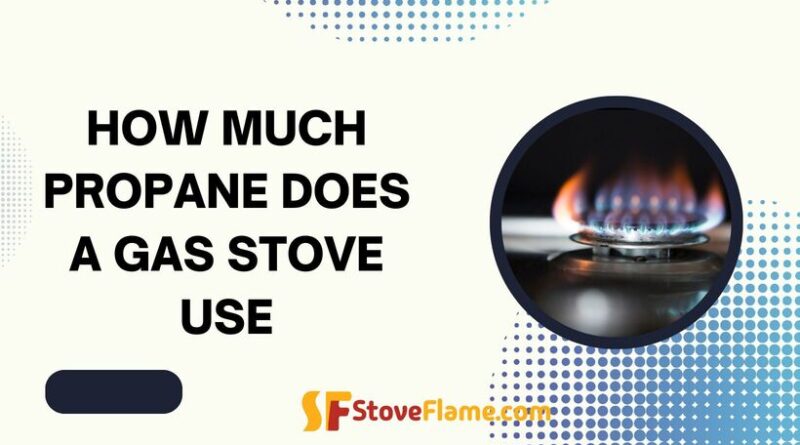How Much Propane Does a Gas Stove Use?
When it comes to cooking with a gas stove, one of the most common questions is how much propane is actually being consumed. Propane, a popular fuel choice for stoves, is a versatile and efficient resource for cooking. However, it is important for users to understand the amount of propane being used in order to properly budget and maintain their supply.
This article explores the various factors that impact the propane consumption of a gas stove and offers practical tips on monitoring and conserving fuel usage. By the end, you will have a clearer idea of how much propane their gas stoves require and will be empowered to make informed choices regarding their fuel consumption. Whether you are a new gas stove user or seeking to efficiently manage your propane usage, continue reading to gain insight into the actual propane consumption of your gas stove.
Understanding Propane Usage for Stovetops
Propane is a commonly used fuel source for gas stovetops due to its efficiency and affordability. Understanding how propane is used can help you optimize its usage and ensure that you have an uninterrupted cooking experience. One important factor to consider is the size and BTU rating of your stovetop burners. Larger burners with higher BTU ratings will consume more propane compared to smaller, lower BTU burners.
Additionally, the frequency and duration of your cooking sessions will also impact propane usage. If you frequently cook for long periods or use multiple burners simultaneously, you may need to refill your propane tank more often. Monitoring the flame size and adjusting it to the desired heat level can also help conserve propane. By being mindful of these factors and making necessary adjustments, you can effectively manage your propane usage for your gas stovetop.
How Much Propane Does a Gas Stove Use?
When it comes to determining how much propane your gas stove will use, there are a few key factors to consider. Firstly, the size and BTU rating of your burners will play a significant role. Larger burners with higher BTU ratings will consume more propane compared to smaller ones.
Additionally, the frequency and duration of your cooking sessions will impact propane usage. If you frequently cook for long periods or use multiple burners simultaneously, you may need to refill your propane tank more often. It’s also worth noting that adjusting the flame size to your desired heat level can help conserve propane. By being mindful of these factors and making necessary adjustments, you can effectively manage your propane usage for your gas stove, ensuring that you have enough fuel for your cooking needs.
Cooking time vs. Propane usage
The cooking time of your meals can have a direct impact on the propane usage of your gas stove. The longer you cook, the more propane you will likely use. This is because the burners will be running for an extended period, consuming more fuel to maintain the desired heat. If you find that your meals require longer cooking times, it’s important to keep an eye on your propane level and plan accordingly.
Consider using more energy-efficient cooking methods, such as simmering instead of boiling vigorously, to reduce the time your burners are in use and conserve propane. Additionally, using lids on pots and pans can help trap heat, allowing you to cook faster and potentially use less propane.
Tips To Conserve Propane Usage
In order to conserve propane usage and make the most out of your gas stove, there are a few helpful tips you can follow. Firstly, it’s important to regularly clean and maintain your stove to ensure it is operating efficiently. A well-maintained stove will use propane more effectively, reducing waste.
Additionally, consider using smaller pots and pans that fit the size of your burners. This helps to maximize the heat transfer and minimize heat loss, ultimately reducing the amount of propane needed.
Another useful tip is to preheat your oven only when necessary, as excessive preheating can lead to
unnecessary propane consumption. Lastly, make it a habit to turn off the burner a few minutes before your food is fully cooked. The residual heat will continue cooking your meal without using any additional propane.
Proper Maintenance for Efficient Usage
To ensure efficient usage of your gas stove and minimize propane consumption, it is important to prioritize proper maintenance. Regularly clean the burners and stovetop to prevent any clogs or blockages that could disrupt the flow of propane. Check the gas connections for any leaks or loose fittings, and tighten them if necessary.
It’s also a good idea to inspect the burner flames – they should have a steady blue flame, indicating efficient combustion. If you notice any yellow or flickering flames, it could be a sign of an issue that needs attention.
Additionally, scheduling professional tune-ups and inspections for your gas stove can help identify and address any potential efficiency problems. By taking these maintenance steps, you can ensure that your gas stove operates optimally, reducing propane usage while still enjoying the convenience and benefits of cooking with gas.
Safety Precautions for Propane Usage
Ensuring the safe usage of propane is crucial when operating a gas stove. Always make sure the area around the stove is well-ventilated to prevent the build-up of potentially harmful gases. Keep flammable materials away from the stove and never store propane cylinders indoors. When connecting or disconnecting the cylinder, ensure the stove is turned off and any open flames are extinguished.
Regularly check the hoses and connections for any signs of wear or damage, and replace them if necessary. If you ever detect a gas leak, immediately turn off the stove, ventilate the area, and contact a professional for assistance.
Additionally, it’s important to educate everyone in your household about propane safety and how to respond in case of emergencies. By following these safety precautions, you can enjoy the benefits of a gas stove while prioritizing the well-being of yourself and your loved ones.
Budgeting For Propane Expenses
When it comes to budgeting for propane expenses, it’s important to take into account a few key factors. Firstly, consider the frequency of your gas stove usage. If you cook meals on the stove daily, you will naturally consume more propane compared to someone who only uses it occasionally.
Additionally, the size of your household and the number of people you are cooking for can also impact propane consumption. Another important consideration is the efficiency of your gas stove.
Older models may use more propane compared to newer, energy-efficient ones. It’s also worth noting that propane prices can vary, so it’s a good idea to research and compare prices from different suppliers to ensure you are getting the best deal. By factoring in these variables and estimating your propane usage, you can create a realistic budget that allows for the necessary expenses while still managing your overall household finances effectively.
Conclusion
In conclusion, understanding how much propane your gas stove uses can save you time and money in the long run. By following these simple steps and calculations, you can determine the approximate amount of propane you will need for your cooking needs. Remember to always check and maintain your gas stove to ensure it is using propane efficiently. With these tips, you can confidently cook on your gas stove without worrying about running out of propane.
.
I'm Daniel Miller, the proud owner of StoveFlame. With over five years of experience in this dynamic field, I've honed my skills and passion for delivering top-notch quality and accuracy in everything I do.





